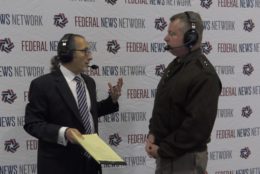Workforce
-
The General Services Administration, under the authority to fast-track the process, is selling federal properties considered valuable but underutilized by their agency tenants.
November 05, 2021 -
The General Services Administration sees a unique opportunity to reduce the federal government’s office footprint over the coming years, as agencies reconsider their office space needs following the COVID-19 pandemic.
November 02, 2021 -
The chairman of the House readiness subcommittee wants detailed, near-term plans on what the military services are doing to address deteriorating facility conditions within the next three months.
October 29, 2021 -
Natural language processing and automation are some of the technologies agencies are considering both to cope with an aging out of the federal workforce.
October 27, 2021 -
The Army also has completed the establishment of a national chain of what it calls MDRS's - Modernization, displacement and repair sites.
October 15, 2021 -
Federal Drive with Tom Temin caught up with the deputy commander of the Army's installations management command, Maj. Gen. Omar Jones.
October 14, 2021 -
A recent executive order forces all of government to consider how the federal work environment — from the digital tools agencies use to the physical workspace — can best meet everyone's needs, including employees with disabilities.
October 13, 2021 -
A total of 23 agencies have detailed new climate change strategies, part of their response to a January executive order from President Joe Biden.
October 07, 2021 -
The maintenance backlog stands at about $3 billion and the number of facilities is growing faster than the budget.
September 29, 2021 -
The Saving Money and Accelerating Repairs Through (SMART) Leasing Act would allow agencies to sublease underutilized real estate to “any person or entity at fair market value,” including another federal, state, or local government agency.
September 23, 2021 -
The pandemic created big challenges for the nation’s immigration courts, which are used to doing business in person. Inconsistent policies and a lack of stakeholder engagement made things more difficult than they needed to be.
September 22, 2021 -
As a way to "minimize disruptions," the Bureau of Land Management will not require employees, with the exception of a few core senior leaders, to move to Washington, D.C., the Interior Department said.
September 17, 2021 -
Workhorse Group, an electric vehicle company on the Postal Service's shortlist to manufacture its next-generation delivery vehicle fleet, is ending its legal battle against USPS and contract award recipient Oshkosh Defense.
September 15, 2021 -
The House Oversight and Reform Committee on Thursday approved $12 billion for federal electric vehicles as part of the $3.5 trillion budget reconciliation package proposed by Democrats.
September 03, 2021 -
It took a lot of technology work to keep the government operating remotely through the pandemic. But what about the finances of it all?
September 03, 2021













